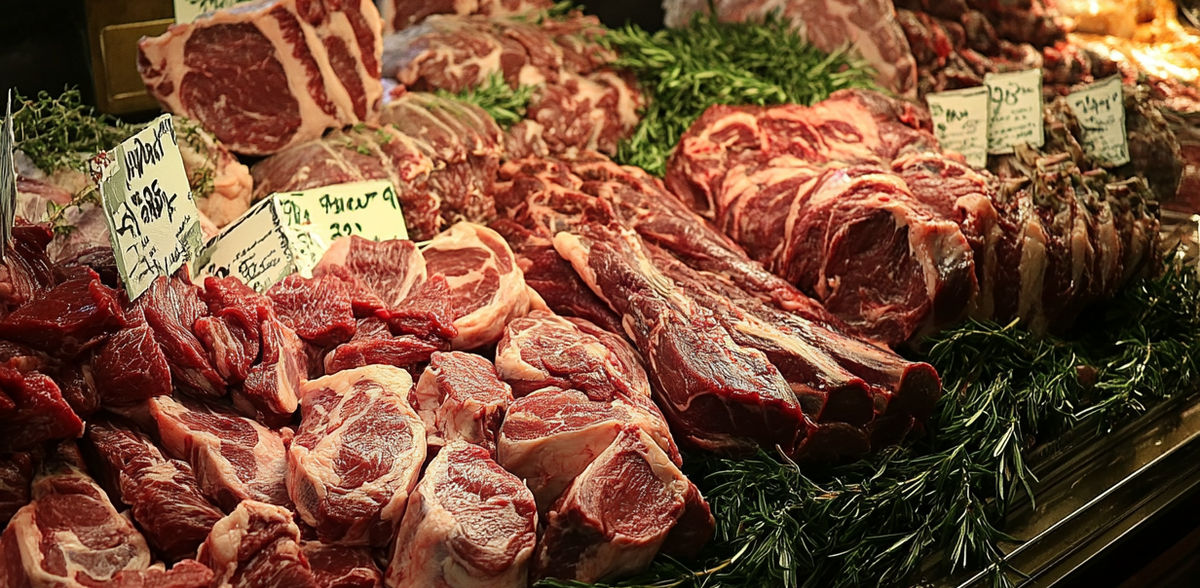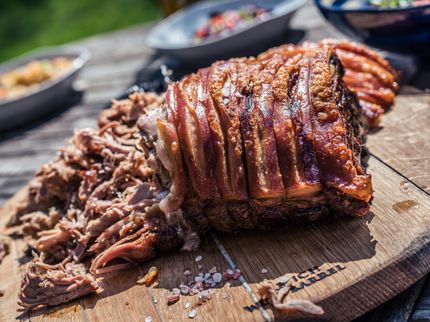Meat consumption remains at a low level
ProVeg speaks of "intermediate plateau" and underlines call for a future nutrition plan
After five years of decline, meat consumption in Germany has risen slightly again for the first time. At 53.2 kilograms per capita, consumption increased by around 0.3 kilograms in 2024 compared to the previous year, reports the Federal Agricultural Information Center.1 Based on the 2022 census, a recalculation was carried out this year that no longer allows comparisons to be made with values prior to 2022. "According to the new calculation, meat consumption in Germany has reached an intermediate plateau," says Matthias Rohra, Managing Director of ProVeg Deutschland. The food organization appeals to politicians not to rest on their laurels.
Meat consumption in Germany was still at 61 kilograms in 2018. It then reached new lows year after year. The census-related recalculation now paints a largely stable picture for 2022 to 2024. In 2022, consumption was 52.8 kilograms per capita and has changed by less than 500 grams since then.2
"The latest meat consumption statistics show once again that politicians must continue their efforts to ensure a sustainable diet," explains Rohra. "And plant-based food belongs on the plate of the future." Before this year's parliamentary elections, ProVeg called on the future German government to draw up a future food plan with concrete and binding milestones - and now sees itself vindicated.
More poultry consumption despite bird flu
In 2024, poultry meat in particular was consumed more frequently in households: per capita consumption increased by 0.5 kilograms. In contrast, there was hardly any change in beef and pork compared to 2023: While per capita consumption of beef remained unchanged, consumption of pork decreased again - by 0.1 kilograms.
The increase in poultry consumption coincides with a strong increase in vigilance on the part of authorities and farmers due to regular outbreaks of bird flu. As recently as January, the H5N1 subtype virus was detected in a farm with almost 50,000 turkeys in Baden-Württemberg and in a farm with around 11,000 turkeys in Lower Saxony. The trade magazine agrarheute reports on current cases in a news ticker - and made eight reports in 2024 alone.3
Future food plan based on the Danish model
For a future-proof food industry, ProVeg believes that Germany needs a future food plan that combines innovative technological development, stable agriculture and secure domestic demand. Denmark sets a good example here and shows that it only needs 0.045 percent of its gross domestic product for this.4
The conditions in Germany are good: demand for plant-based products is increasing in Germany. According to the Federal Ministry of Food and Agriculture, four out of ten consumers already regularly choose plant-based alternatives.5 According to the Federal Statistical Office, the production of plant-based meat alternatives has risen by 114% since 2019.6
Farmers can also benefit from this: According to agricultural researchers at the Thünen Institute, a plant-based diet could increase agricultural income in Germany by 22.7 percent by 2050, while vegetable farms can expect up to 50 percent more income.7
Sources
1 Federal Information Center for Agriculture (2025): Supply balance for meat: Consumption slightly increased, press release from 27.03.2025. Online at: https://www.ble.de/SharedDocs/Pressemitteilungen/DE/2025/250327_Fleischbilanz.html
2 Federal Information Center for Agriculture (2025): Meat and poultry - supply of meat in Germany in the calendar year 2010-2024 (recalculation). Online at: https://www.ble.de/DE/BZL/Daten-Berichte/Fleisch/fleisch_node.html
3 Agrarheute (2025): Renewed outbreak of bird flu: 11,500 laying hens culled in Lower Saxony, as of 25.03.2025. Online at: https://www.agrarheute.com/tier/vogelgrippe-deutschland-16000-puten-betroffen-529519
4 The Guardian (2025): 'Insanely tasty green food': how the meaty Danes embraced a world-first plant-based plan published on 31.01.2025. Online at: https://www.theguardian.com/environment/2025/jan/31/more-carrot-less-stick-how-meat-loving-danes-were-sold-a-plant-led-world-first
5 Federal Ministry of Food and Agriculture (2024): Deutschland, wie es isst - Der BMEL-Ernährungsreport 2024, published on 24.09.2024. Online at: https://www.bmel.de/SharedDocs/Downloads/DE/Broschueren/ernaehrungsreport-2024.pdf?__blob=publicationFile&v=4
6 Federal Statistical Office (2024): Trend towards meat substitutes unbroken: Production increases by 16.6% in 2023 compared to the previous year, press release from 02.05.2024. Online at: https://www.destatis.de/DE/Presse/Pressemitteilungen/2024/05/PD24_N018_42.html
7 Rieger, J., F. Freund et al. (2023): From Fork to Farm: Impacts of more sustainable diets in the EU-27 on the agricultural sector, in: Journal of Agricultural Economics 74(3), pp. 764-784. Online at: https://doi.org/10.1111/1477-9552.12530
Note: This article has been translated using a computer system without human intervention. LUMITOS offers these automatic translations to present a wider range of current news. Since this article has been translated with automatic translation, it is possible that it contains errors in vocabulary, syntax or grammar. The original article in German can be found here.






























































